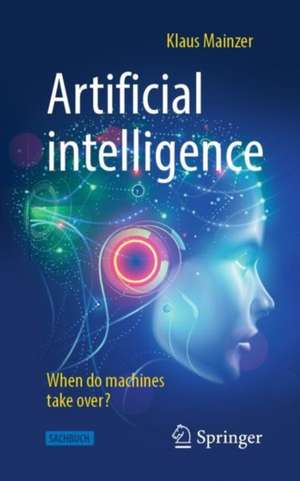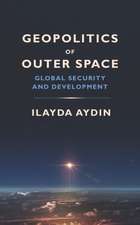Artificial intelligence - When do machines take over?: Technik im Fokus
Autor Klaus Mainzeren Limba Engleză Paperback – 24 oct 2019
Everybody knows them. Smartphones that talk to us, wristwatches that record our health data, workflows that organize themselves automatically, cars, airplanes and drones that control themselves, traffic and energy systems with autonomous logistics or robots that explore distant planets are technical examples of a networked world of intelligent systems. Machine learning is dramatically changing our civilization. We rely more and more on efficient algorithms, because otherwise we will not be able to cope with the complexity of our civilizing infrastructure.
But how secure are AI algorithms? This challenge is taken up in the 2nd edition: Complex neural networks are fed and trained with huge amounts of data (big data). The number of necessary parameters explodes exponentially. Nobody knows exactly what is going on in these "black boxes". In machine learning we need more explainability and accountability of causes and effects in order to be able to decide ethicaland legal questions of responsibility (e.g. in autonomous driving or medicine)! Besides causal learning, we also analyze procedures of tests and verification to get certified AI-programs.
Since its inception, AI research has been associated with great visions of the future of mankind. It is already a key technology that will decide the global competition of social systems. "Artificial Intelligence and Responsibility" is another central supplement to the 2nd edition: How should we secure our individual liberty rights in the AI world? This book is a plea for technology design: AI must prove itself as a service in society.
Din seria Technik im Fokus
-
 Preț: 203.42 lei
Preț: 203.42 lei -
 Preț: 151.13 lei
Preț: 151.13 lei -
 Preț: 155.49 lei
Preț: 155.49 lei -
 Preț: 87.78 lei
Preț: 87.78 lei -
 Preț: 126.77 lei
Preț: 126.77 lei -
 Preț: 127.82 lei
Preț: 127.82 lei - 20%
 Preț: 107.82 lei
Preț: 107.82 lei - 20%
 Preț: 128.26 lei
Preț: 128.26 lei -
 Preț: 131.47 lei
Preț: 131.47 lei -
 Preț: 178.84 lei
Preț: 178.84 lei -
 Preț: 127.82 lei
Preț: 127.82 lei -
 Preț: 163.55 lei
Preț: 163.55 lei -
 Preț: 123.13 lei
Preț: 123.13 lei -
 Preț: 112.92 lei
Preț: 112.92 lei -
 Preț: 123.13 lei
Preț: 123.13 lei -
 Preț: 149.27 lei
Preț: 149.27 lei -
 Preț: 123.13 lei
Preț: 123.13 lei -
 Preț: 149.97 lei
Preț: 149.97 lei -
 Preț: 213.42 lei
Preț: 213.42 lei -
 Preț: 112.30 lei
Preț: 112.30 lei
Preț: 180.99 lei
Nou
Puncte Express: 271
Preț estimativ în valută:
34.64€ • 36.03$ • 29.03£
34.64€ • 36.03$ • 29.03£
Carte disponibilă
Livrare economică 20 februarie-06 martie
Livrare express 06-12 februarie pentru 38.96 lei
Preluare comenzi: 021 569.72.76
Specificații
ISBN-13: 9783662597163
ISBN-10: 3662597160
Pagini: 292
Ilustrații: XI, 279 p. 57 illus., 10 illus. in color.
Dimensiuni: 127 x 203 x 15 mm
Greutate: 0.29 kg
Ediția:1st ed. 2020
Editura: Springer Berlin, Heidelberg
Colecția Springer
Seria Technik im Fokus
Locul publicării:Berlin, Heidelberg, Germany
ISBN-10: 3662597160
Pagini: 292
Ilustrații: XI, 279 p. 57 illus., 10 illus. in color.
Dimensiuni: 127 x 203 x 15 mm
Greutate: 0.29 kg
Ediția:1st ed. 2020
Editura: Springer Berlin, Heidelberg
Colecția Springer
Seria Technik im Fokus
Locul publicării:Berlin, Heidelberg, Germany
Cuprins
Introduction: What is AI?.- A brief history of AI.- Logical thinking becomes automatic.- Systems become experts.- Computers learn to speak.- Algorithms simulate evolution.- Neural networks simulate brains.- Robots become social.- Automobiles become autonomous.- Factories become intelligent.- From natural to artificial to super intelligence?.
Notă biografică
Prof. Klaus Mainzer studied mathematics, physics and philosophy at the University of Münster, where he also earned his doctorate in philosophy (1973) and habilitated. Before his appointment to the Chair of Philosophy and Philosophy of Science at the TUM and his appointment as Director of the Carl von Linde Academy in 2008, he worked as Professor (1981-1988) and Prorector (1985-1988) at the University of Konstanz and as Professor and Founding Director of the Institute for Interdisciplinary Computer Science (1988-2008) at the University of Augsburg. He is a member of numerous (inter)national committees and academies. From 2012 to 2014 he was founding director of the Munich Center for Technology in Society (MCTS).
Textul de pe ultima copertă
Everybody knows them. Smartphones that talk to us, wristwatches that record our health data, workflows that organize themselves automatically, cars, airplanes and drones that control themselves, traffic and energy systems with autonomous logistics or robots that explore distant planets are technical examples of a networked world of intelligent systems. Machine learning is dramatically changing our civilization. We rely more and more on efficient algorithms, because otherwise we will not be able to cope with the complexity of our civilizing infrastructure.
But how secure are AI algorithms? This challenge is taken up here: Complex neural networks are fed and trained with huge amounts of data (big data). The number of necessary parameters explodes exponentially. Nobody knows exactly what is going on in these "black boxes". In machine learning we need more explainability and accountability of causes and effects in order to be able to decide ethical and legal questions of responsibility (e.g. in autonomous driving or medicine). Besides causal learning, we also analyze procedures of tests and verification to get certified AI-programs.
Since its inception, AI research has been associated with great visions of the future of mankind. It is already a key technology that will decide the global competition of social systems. "Artificial Intelligence and Responsibility" is another central supplement to this book: How should we secure our individual liberty rights in the AI world? This book is a plea for technology design: AI must prove itself as a service in society.
But how secure are AI algorithms? This challenge is taken up here: Complex neural networks are fed and trained with huge amounts of data (big data). The number of necessary parameters explodes exponentially. Nobody knows exactly what is going on in these "black boxes". In machine learning we need more explainability and accountability of causes and effects in order to be able to decide ethical and legal questions of responsibility (e.g. in autonomous driving or medicine). Besides causal learning, we also analyze procedures of tests and verification to get certified AI-programs.
Since its inception, AI research has been associated with great visions of the future of mankind. It is already a key technology that will decide the global competition of social systems. "Artificial Intelligence and Responsibility" is another central supplement to this book: How should we secure our individual liberty rights in the AI world? This book is a plea for technology design: AI must prove itself as a service in society.
Caracteristici
Is "artificial intelligence" replacing humans? It explains the logical, scientific and technical foundations of intelligent systems. Should the use of artificial intelligence be limited?


















